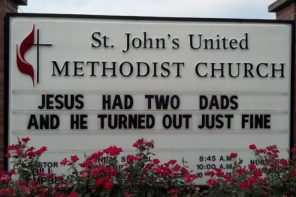Football players are protesting national anthems. Pop stars are critiquing misogynoir and denouncing police violence. Cultural critics writing on race are no longer communicating to a committed few—they are heralded as social prophets.
Faith leaders would do well to consider these signs of the times and to read them closely. Every argument and salvo for racial justice—however justice is imagined—is worth pondering for what it reveals about what kinds of justice are getting traction and public buy-in. Alongside this work of popular engagement, it’s also valuable to convey the riches of religious reflection on racial justice to broad audiences. Here, I have in mind the Southern-born, black bard of Christian mysticism, Howard Thurman.
In our Instagram age, Thurman’s legacy of letters and contemplative black mysticism is often reduced to decontextualized quotes on self-realization, shareable wisdom about finding a sense of inner stillness in a busy, often violent world. Certainly, the sage of Daytona Beach conveys volumes on these topics. But his body of work—especially in texts like Jesus and the Disinherited and Luminous Darkness—juxtaposed the inwardness of faith with a slow-burning scrutiny of social relationships.
Thurman’s take on self-deception is especially important to retrieve in a society where self-righteousness lurks in a thousand places, including our own hearts. Deception, he argues, is a hound of hell that tracks the trail of the disinherited, its barking away the complacency of the gilded and impoverished alike.
And here is where our language deceives us. We cloak the color-coded stratifications of wealth and opportunity in America, for example, with terms like “racial disparity” or “differential outcome.” Deception. Disparity rightly suggests that a problem exists, but the term leaves unspoken the degree and duration of the problem. Black and white unemployment has created two social trajectories of earning power for decades, a legacy carried forward by slavery, the strange career of Jim Crow, and a service economy that looks increasingly like an on-demand, servant economy. Overcoming these problems requires that we name them accurately, even if our problem-solving abilities are outstripped by the enormity of our challenges.
The price of deception, Thurman continues, is to become a deception.
American elections, as we can see so clearly this season, are exercises in deception. The prevailing frame of the ideal voter as middle class and the excessive attention given to our presidential candidates’ tax returns (or lack thereof) and Goldman Sachs speaking fees have obscured more pivotal realities on the other side of the asset and income scale: there is a class of citizens and residents who endure taxation without effective political representation.
Neither candidate, for example, has a major platform to fund capital repairs for public housing communities in cities like New York and Philadelphia, despite widespread knowledge that local housing authorities do not have funds available to make long overdue upgrades.
And affirmative action for people of color is abhorred while what Ira Katznelson named affirmative action for white folks is forgotten. The nation witnessed post-Great Recession Wall Street bailouts while people of color, especially black folks, were foreclosed out of already insecurely held wealth.
Deception haunts our sermons, snickers at our political conversation, scoffs at our cultural musings. The chief deception is the notion that we can have genuine racial equity and economic dignity without overhauling capitalism itself. Domestic workers, retail employees, adjunct college professors, caregivers, and others have spoken this truth. Those of us who speak from American pulpits have not often listened to them. But we might.
In Christian language, I would say that once we acknowledge our near-bottomless tendency for self-deceit, we can then hear the challenging good news of the One who becomes human to bring grace and truth.
But these blessings, in a democracy, are not the sole province of religious vocabularies: with grace and truth beside all of us, the strength to confront structural racism, varieties of sexism, and racialized capitalism may again be ours. And if that strength be ours, perhaps we will venture, in Thurman’s choice phrase, to go to our graves with a shout of defiance.



